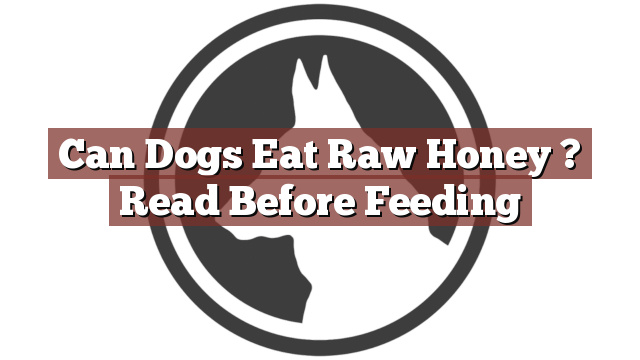Understanding Your Dog’s Dietary Needs
As a pet owner, it is essential to understand your dog’s dietary needs to ensure their overall health and well-being. Dogs are omnivores, which means they can eat a variety of foods, including both meat and plant-based products. However, not all human foods are safe for dogs to consume. Some foods may be toxic and can cause severe health problems. Therefore, it is crucial to be aware of what you should and should not feed your furry friend.
Can Dogs Eat Raw Honey? Read Before Feeding
Can dogs eat raw honey? This is a common question among pet owners who are looking for natural alternatives to processed sugar or who are interested in providing their dogs with additional nutrients. The answer is yes, dogs can eat raw honey, but in moderation. Raw honey is safe for dogs to consume as long as it is given in appropriate quantities and with caution.
Pros and Cons of Feeding Raw Honey to Dogs
Feeding raw honey to dogs can have both benefits and drawbacks. Here are some pros and cons to consider before incorporating raw honey into your dog’s diet:
Pros:
-
Nutritional Benefits: Raw honey contains vitamins, minerals, and antioxidants that can support your dog’s immune system and provide energy.
-
Allergy Relief: Raw honey has natural anti-inflammatory properties, which can help alleviate symptoms of seasonal allergies in dogs.
-
Digestive Aid: The enzymes present in raw honey can assist in promoting a healthy digestive system for your dog.
Cons:
-
High Sugar Content: Raw honey is high in sugar, which can lead to weight gain and dental issues if consumed excessively.
-
Botulism Risk: Raw honey may contain the bacteria that causes botulism, which is harmful to dogs. However, this risk is minimal in healthy adult dogs.
-
Allergic Reactions: Some dogs may be allergic to honey, so it is important to monitor their reaction after feeding them small amounts.
Conclusion: Making an Informed Decision for Your Dog’s Health
Can a dog eat raw honey? Yes, they can. However, it is vital to consult with your veterinarian before introducing any new food into your dog’s diet, including raw honey. Every dog is unique, and their dietary needs may vary based on their age, breed, and health conditions. Your vet can provide personalized advice regarding the appropriate amount of raw honey that can be safely incorporated into your dog’s diet. Remember, moderation is key when it comes to feeding your dog any new food, including raw honey, to ensure their overall health and well-being.
Thank you for taking the time to read through our exploration of [page_title]. As every dog lover knows, our furry friends have unique dietary needs and responses, often varying from one canine to another. This is why it's paramount to approach any changes in their diet with caution and knowledge.
Before introducing any new treats or making alterations to your dog's diet based on our insights, it's crucial to consult with a veterinarian about [page_title]. Their expertise ensures that the choices you make are well-suited to your particular pet's health and well-being.
Even seemingly harmless foods can sometimes lead to allergic reactions or digestive issues, which is why monitoring your dog after introducing any new food item is essential.
The content provided here on [page_title] is crafted with care, thorough research, and a genuine love for dogs. Nevertheless, it serves as a general guideline and should not be considered a substitute for professional veterinary advice.
Always prioritize the expert insights of your veterinarian, and remember that the health and happiness of your furry companion come first.
May your journey with your pet continue to be filled with joy, love, and safe culinary adventures. Happy reading, and even happier snacking for your canine friend!

